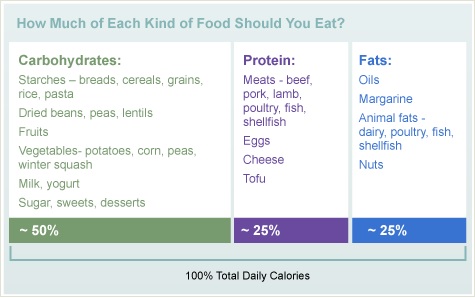Understanding Food
Main sources of calories in food
To begin with, let us talk about food in general. We obtain nutrients from the foods we eat. Foods supply us with energy, or calories. To keep your body running, you need three types of food:
• Carbohydrate
• Protein
• Fat
Calories in food
However, all food is not equal in calories. Fat, for example, has more than twice the calories, gram for gram, as equal amounts of carbohydrates or protein.
• Fat = 9 calories per gram
• Carbohydrate = 4 calories per gram
• Protein = 4 calories per gram

How much carbohydrate, protein and fat do I need each day?
The typical range is:
• Carbohydrates – 45 to 65% of your daily calories
• Protein – 10 to 35% of your daily calories
• Fat- 25 to 35% of your daily calories
This is the case whether you have or do not have diabetes.
Carbohydrates
If you have diabetes, you have to know about carbohydrates.
Why? Among all the foods, carbohydrates have the largest effect on your blood sugar. Carbohydrates include starch and sugars.
During digestion, both forms of carbohydrate break down in your body to single units of sugar, called glucose. Carbohydrate is an important part of your diet because the most common sugar unit, glucose, is your body’s preferred source of energy or fuel.
You do not need to avoid carbohydrates because of diabetes. Just be able to identify which foods have carbohydrates, and then control the amount you eat.
Carbohydrates are found in:
• Rice, grains, cereals, and pasta (macaroni, spaghetti etc.)
• Bread, bakes, ground provision (yam, dasheen, sweet potato), crackers (Crix)
• Dried beans, split peas and lentils
• Vegetables, like potatoes, corn, peas
• Fruit
• Milk
• Yogurt
• Sugars, like table sugar and honey
• Foods and drinks made with sugar, like regular soft drinks and desserts
If you have type 1 diabetes, match your carbohydrate intake to your insulin dose. To get the best blood sugar result, your carbohydrate count must be accurate.
Carbohydrates are counted in grams – and even a few grams more or less can make a difference in your blood sugar reading.
Similarly, if you have type 2 diabetes, and are treated with medications that cause insulin to be released from the pancreas or insulin, you also must match your carbohydrate intake to your medication dose. To get the best blood sugar result, your carbohydrate count must be accurate.
Proteins
Protein is an essential part of your diet — and your body. But too much of a good thing can be bad for you. Most meats have fat as well as protein. Excess protein from animal sources can mean excess calories and fat – which means a greater chance at gaining weight.
Proteins are found in:
• Beef and pork
• Poultry
• Fish and shellfish
• Eggs
• Dairy products, like regular cheese
• Plant-based proteins, like beans and nuts
The best advice about protein: get what you need from low-fat protein sources like lean meats, poultry and fish, low fat or nonfat dairy products, and vegetarian protein sources like tofu. If you have kidney problems, you may need to limit how much protein you eat.
Fats
Fat is another important part of your diet. Remember that fat has twice the calories as equal amounts of carbohydrate or protein. Limiting the fat you eat will help you control your weight and prevent heart and blood vessel disease.
Fats are found in:
• Butter and margarine
• Oils, like vegetable oil, olive oil and canola oil
• Salad dressing and mayonnaise
• Nuts and seeds
• Meat and protein foods, like beef, cheese, bacon and hot dogs
Some fats and oils are heart healthy; others are not. Take the time to make low fat choices, and choose heart-healthy fats.
Food Breakdown

Modified from UCSF Learning Library
 BCDF
BCDF